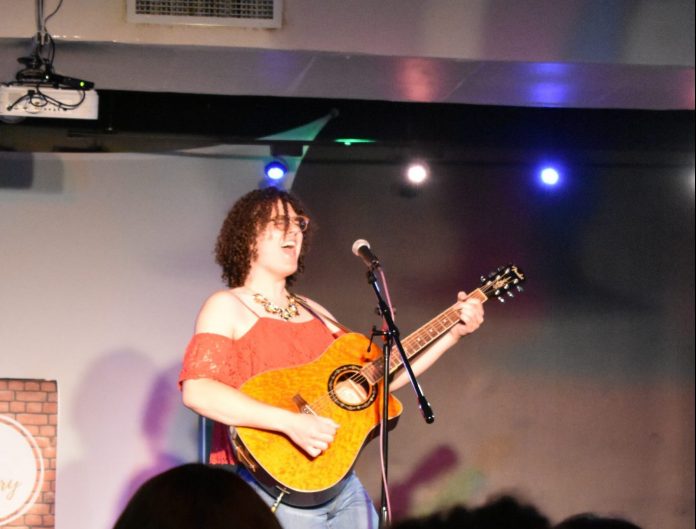One hundred years since the graduation of the first 24 white women to attend the College of William and Mary, 24 women took to the stage of Lodge One to express their experiences as women at the College today. This showcase represented the student commemoration of 100 years of women and was created to give a platform for women currently enrolled at the College to share their experiences.
The performances took many different forms, ranging from personal essays to musical ensembles, from literary analyses to ukulele solos. During their performance, each woman attempted to capture what existing at the College today meant to her.
Karis Lee ’19 opened the show by reading a few of her personal poems. She explained that the first poem she read, “Morning Routine,” came out of thinking about how small she had made herself and how much she worried about taking up too much space. So she wrote a second iteration of the poem, granting herself the space she needed to exist without constraints.
“I made a resolution to take up as much space as I want,” Lee said. “I’m going to take from this world as if it owes me something, the way I think many men walk through the world.”
Next, Flora Valdés-Dapena ’19 took the stage to talk about embracing her differences, performing an acoustic rendition of Kesha’s “Bastards.” She spoke about her experience at the College as one defined by her differences, and how she didn’t want her marginalized identities to pigeonhole her.
“I feel like the bastards getting me down [are] the people telling me I need to be a certain way,” Valdés-Dapena said.
Following Valdés-Dapena’s performance, Louisa Janssen ’20 spoke to the audience about her struggle pursuing a career that her family doesn’t support. Janssen said that while her family at home might prefer her to pursue a job in medicine, she realized her true home is at the College where she has found support for her new career path.
Alexa Mason ’19 spoke about her experience as a black woman at the College. She revealed to the audience what she wished she had been told when first arriving on campus. She described her belief that college should be thought of as a transformative experience rather than a series of exams. She also emphasized that students who go here should not downplay their intelligence in order to make others appear smarter — the College and the world are made better by experiencing you as fully as possible.
“Know that the path you walk here makes it just a little easier for all the Marys who come after you,” Mason said.
Some performers highlighted ways the College has helped them overcome personal struggles.
Frida Salmoran ’19 spoke about her struggle to unite her identities. She said that she grew up attempting to whitewash herself, but throughout her experiences at the College she felt more and more at home in her own skin every day.
Other performers took the time to recognize the impact of their female influences.
Jackie Keshner ’19 presented 24 different messages to her female friends and mentors at the College. She expressed gratitude for their support, awe at their endeavors, and appreciation for how they pushed her to a greater level of intentionality.
Still others drew attention to the fact that this centennial is only celebrating 100 years of white women on campus.
Camryn Easley ’20 spoke about how the idea that “Mary” can represent all women at the College is flawed. She said that this College belongs to the Marys and the Williams, but that she does not need their permission to exist here. Easley emphasized that while she loves the College and all the Marys and Williams who attend it, it’s in more of a “thank you, next” kind of way.
“The most important lesson I’ve learned here is that I love Camryn, and Camryn loves me,” Easley said.
Many more students spoke and performed on the stage of Lodge One as the night progressed, and the audience moved in and out as students came to support their friends. As the crowd mingled and women continued to speak about the heartwarming and heartbreaking experiences that contributed to their college careers, the sentiments of Mohini Jodhpurkar ’19 seemed to encapsulate the mood felt in the room.
“It’s important to learn from history, to see our mistakes and learn where to grow,” Jodhpurkar said. “There’s so much that’s true now that wasn’t true then. William and Mary has improved in so many ways, but there is so much left to do. But what I know about the students here is that we sure as hell don’t give up.”

